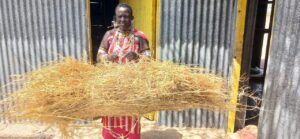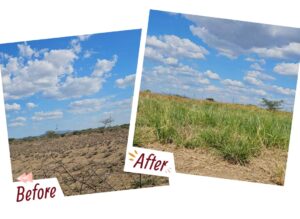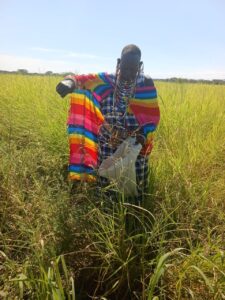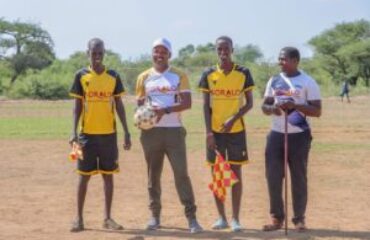
 Meet Charity, a lively young mother and one of the 80 women participating in our grass seedbank restoration project in Lenkobei, a small pastoral community located near our resource center in Lale’enok. As we approach, we find her focused on wrapping a bale of hay. “This is my livelihood now,” she says with a smile that radiates a quiet pride. “One bale sells for Kshs. 300, and that helps cover our everyday household expenses.”
Meet Charity, a lively young mother and one of the 80 women participating in our grass seedbank restoration project in Lenkobei, a small pastoral community located near our resource center in Lale’enok. As we approach, we find her focused on wrapping a bale of hay. “This is my livelihood now,” she says with a smile that radiates a quiet pride. “One bale sells for Kshs. 300, and that helps cover our everyday household expenses.”
Lenkobei is one of the communities that have long struggled with the challenges of deforestation land degradation. For years, women like Charity faced the burden of feeding their families while coping with these damaging effects on their land. The situation worsened in 2020-2022, when we experienced the worst drought in 40 years in East Africa, devastating livestock and crops across the region. Women, who are often responsible for collecting water, food, and firewood, are especially the worst hit. With fewer resources available, they endure heightened food insecurity and a loss of livelihood. Yet, amidst this the women have found a way to rise above their challenges. Through the rangeland restoration program, a collaborative effort with ourselves and Justdiggit, a grassroots organization working to re-green African landscapes and support from a joint grant from TerraFund, they have turned th eir land into a vital source of sustenance and income.
eir land into a vital source of sustenance and income.
As one of the 80 women involved in the grass seedbank restoration project, Charity has experienced firsthand the power of empowerment and sustainable land management. Through hard work and dedication, they have transformed their land, now managing four 10-acre grass seedbank plots spread across the landscape. These plots provide essential feed for their livestock, which is critical for their survival, while also offering a new and sustainable income stream.
The project’s success can be attributed to the all-inclusive approach taken to address both the immediate needs and long-term sustainability of the community. The women have been trained in all aspects of land management, from preparing the soil and planting to harvesting and storing grass and seeds. Once the grass matures, they harvest it, it is dried, packaged into bales, and ready for the market. “We also train them in business skill, how to price, market, and keep accurate records of their produce,” says Mr. Ogeli Makui, Head of Rangelands, who oversees the project.
The results of their efforts are impressive. To date the women have harvested over 1,358 kilograms of grass seeds which they sold at Kshs. 600 per kilo earning a total of Kshs. 814,800. They also sold Kshs. 33,000 worth of grass bales to their local communities. Looking ahead, the program is exploring the possibility of purchasing a bailing machine, which the women will use on a rotating basis. This will significantly ease the process of storing and handling their produce, improving quality, efficiency and reliability.

The impact of this project goes beyond economic benefits. “By empowering women and ensuring their active participation in decision-making, we have helped create a more sustainable and equitable solution for the community,” Mr. Makui explains. “Oftentimes, women are left out at the community level, but they are central to sustainable livelihoods because of the vital role they play in our communities,” he concludes.




